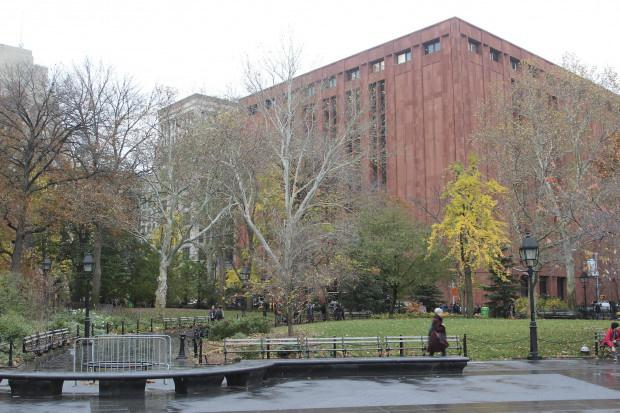NYU Feels Climate Change in Wild Winter
New York’s recent spout of abnormally warm weather has further provoked the climate change debate.
March 27, 2017
Nice weather we’re having. This year, there were several days in February when the temperature was 60 or more degrees and March came with 70-degree highs. There’s no denying that recent weather patterns have been wacky, but some students, such as Tisch junior David Scherker, view this as cause for concern about climate change.
“It could be something similar to the calm before a storm, but on a grander, world-wide level,” Scherker said. “Something that changes so largely on a global level usually doesn’t end well.”
According to the National Oceanic and Atmospheric Administration, the United States had the second warmest February in a 123-year period of record and the sixth warmest winter overall. The World Weather Attribution, an international coalition of scientists, confirmed that the February heat was a direct cause of climate change.
Despite the overwhelming consensus in the scientific community that climate change is man-made, deniers remain. Prominent congressmen such as Senator Mitch McConnell and Senator Marco Rubio have spoken against man-made climate change.
Some NYU community members such as Professor of Biology and Environmental Studies Tyler Volk believe that the country’s two-party system might be the cause of this denial.
“The denying that exists in the United States does not exist in Europe,” Volk said. “There’s something about the polarized, political conditions in the United States with the locked-in two-party system that may lend itself to these kinds of absolute denials as a way to get political backing from a certain kind of base.”
Volk’s claims are backed by a 2016 Pew Research study called “The Politics of Climate,” which found that 79 percent of liberal Democrats believed in man-made climate change as opposed to 15 percent of conservative Republicans — an evident divide along party lines.
Deniers like McConnell and Rubio argue that climate change activism does nothing but hurt the economy and threaten the jobs of those in the coal and oil industry. However, some beg to differ.
Scherker believes that there are probably as many jobs available for sustainable resources as there are for unsustainable resources that fuel climate change.
Professor Volk expressed similar sentiments.
“I’ve heard there’s more jobs in wind and solar happening than in coal,” Volk said. “Coal jobs are gonna happen where there are coal mines. Solar and wind can happen almost anywhere.”
Bloomberg reported that in 2016 there were more employment opportunities in the solar industry than in the gas and coal extraction industries. The report also said that employment in
clean-energy jobs increased by five percent between 2015 and 2016.
Tisch junior Matiss Kaza, an international student from Latvia, is also looking at the long-term consequences. He worries about the impact climate change will have on the ecosystem — wildlife, plant life and human life — in the next 50 to 200 years.
“I think this is just one instance of a very global problem,” Kaza said. “It’s the same thing in my country — the weather is getting much warmer in that we’re experiencing these record high temperatures every summer”.
If communities work together both locally and globally, it is possible to bring down greenhouse gas and CO2 emissions to more natural levels, according to the EPA. However, this is a slow geological process that can take hundreds of thousands of years.
Professor Volk believes that one of the most effective changes we can make right now is to help those who are hurt the most by climate change — the people in impoverished areas who burn the least fossil fuels.
“We have to do something ultimately about the energy system,” Volk said. “A lot of the world is in poverty. They need more [sustainable, renewable] energy, not less.”
A version of this article appeared in the Monday, March 27 print edition. Email Laura Rubio at [email protected]
























































































































































